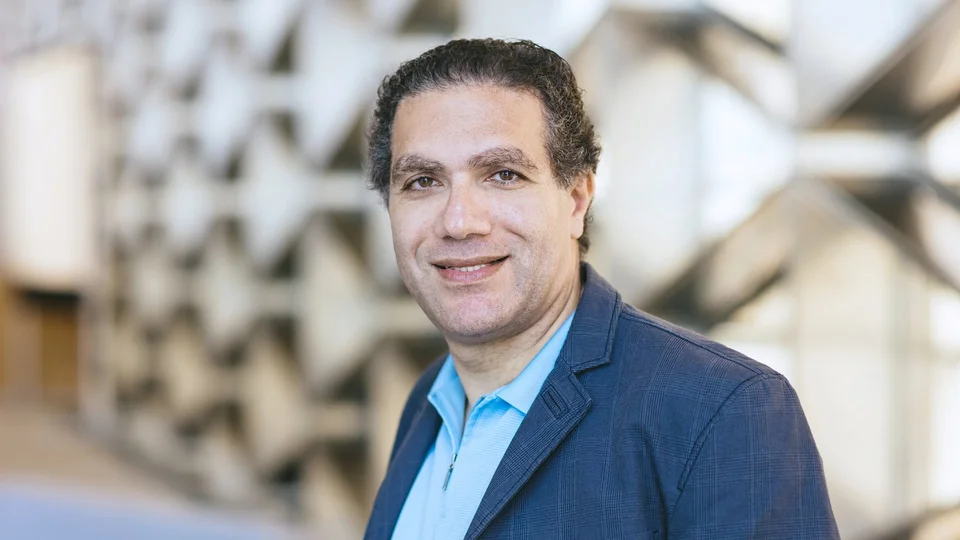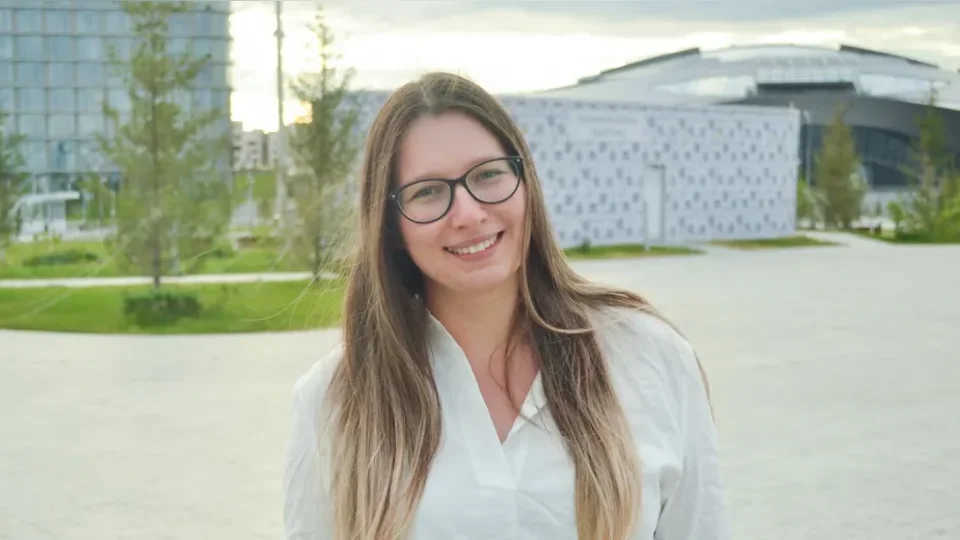
International recognition for KAUST Ph.D. candidate Olga Krestinskaya
Olga Krestinskaya, a KAUST Ph.D. student, wins Best Poster at the 2024 Nature Neuromorphic Computing Conference for her work on energy-efficient AI hardware.
About
Olga Krestinskaya, a Ph.D. candidate and member of the KAUST Sensors Lab, recently won the Best Poster Award at the 2nd Nature Conference on Neuromorphic Computing. Krestinskaya, who works under the supervision of Professor Khaled Salama, received the award based on her recent first-author work published in Nature Reviews Electrical Engineering.
This interdisciplinary conference, held in Beijing, China, from October 13–16 2024, was organized by Tsinghua University, China, Nature Communications, Nature Electronics, Nature Reviews Electrical Engineering, Nature Nanotechnology, Nature Computational Science, and Nature Communications Engineering. A central focus of the event was the development future brain-based computing technologies.
The KAUST student’s winning entry resulted from a collaborative effort with renowned industry and academia experts from IBM, Rain, KAUST, the University of Singapore, and three U.S. universities: Duke University, UC Irvine and the University of Michigan.
Titled 'Neural architecture search for in-memory computing-based deep learning accelerators,' Krestinskaya and colleagues’ study emphasizes the critical role of software-hardware co-design in creating efficient in-memory computing (IMC) accelerators.
A promising approach to advance neural networks
Due to the rapid growth of artificial intelligence (AI) and the increasing complexity of neural network models, the demand for efficient hardware architectures—specifically, architectures that can address power-constrained and resource-constrained deployments—is on the rise. In this context, the emergence of IMC stands out as a promising technology.
“IMC hardware holds tremendous potential for accelerating AI across a wide range of systems. As AI becomes an everyday part of our lives, the models powering these systems grow increasingly complex, and the hardware becomes more power-hungry,” Krestinskaya noted. “To support AI’s growth sustainably, we are tasked with creating more efficient hardware solutions.”
In their recent Nature article, the team demonstrated how hardware-aware neural architecture search (HW-NAS) has emerged as a promising approach to accelerate the design of streamlined neural networks tailored for efficient deployment on IMC hardware.
Achieving maximum efficiency while maintaining high performance in these accelerators requires co-optimizing software and hardware at every level, from device parameters and circuits to system design and AI models. With numerous parameters to optimize, manual tuning is impracticable.
“Every interaction with AI tools like ChatGPT relies on massive data centers with significant energy demands, raising concerns over carbon emissions. IMC accelerators perform computations directly within memory and are excellent candidates for reducing power consumption. Our approach can enable AI to run efficiently even on low-power edge devices, like mobile phones,” she explained.
Supporting the rapid growth of in-Kingdom AI
As part of its transformative Vision 2030 program, Saudi Arabia is rapidly becoming one of the world's leading innovators and implementers of AI. Presently, the Kingdom seeks to embed AI as a cornerstone tool for improving economic growth, enhancing services and the quality of life of its citizens.
Innovative initiatives, such as the recently launched "One Million Saudi in AI," highlight the Kingdom’s investment in building future-ready skills. Krestinskaya emphasizes the foundational role of hardware in this progress, noting, “Historically, AI advancements have been driven by breakthroughs in hardware innovation. Without robust hardware, the powerful AI models we have today would not be possible. I believe that developing efficient AI hardware is a fundamental pillar for the future of technological innovation in the Kingdom and beyond.”
A worthy place among the top young female scientists
Krestinskaya’s outstanding research around software-hardware co-design for IMC architectures has also earned her a place in the upcoming Asian Deans’ Forum 2024 Rising Stars Women in Engineering Workshop.
The international workshop, which took place from Sunday, 17 November, to Tuesday, 19 November 2024, facilitated scientific and career-oriented discussions and brought together young female professionals in engineering disciplines from around the world.
“When I received the news that I would be attending the Forum, I was thrilled. It is a great honor to have my work and research recognized globally. This recognition validates the hard work and dedication I have invested in my Ph.D. research and opens up new opportunities for me to make a broader impact.
“I want to develop both the technical expertise necessary for my research and the soft skills essential for a successful career; and I believe, so far, I have achieved a solid foundation in both. Looking ahead, my main goal is to advance my research to a level where it can make a meaningful impact in AI hardware, particularly in the in-memory computing community,” she concluded.

